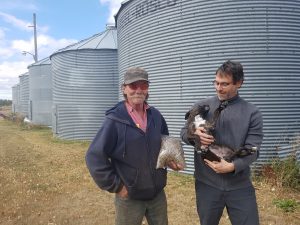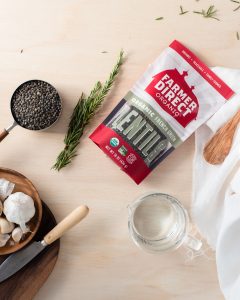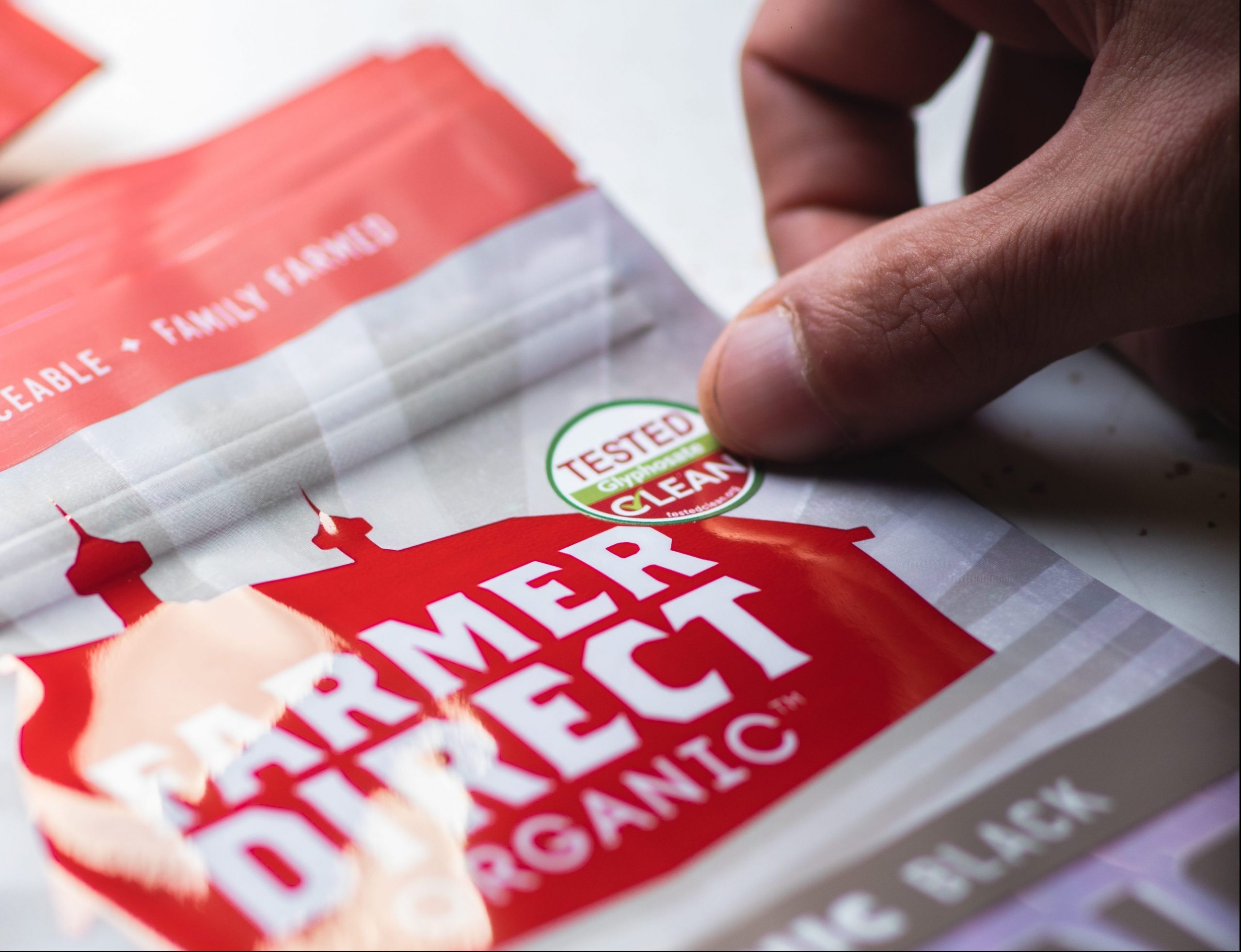As concerns about glyphosate herbicide and its link to cancer mount, a growing number of food companies are having their products tested and certified as being glyphosate-free. Farmer Direct Organic, a producer of organic beans, peas, and grains based in Regina, Saskatchewan, decided to seek glyphosate-free certification to see if the herbicide was contaminating its organic farmers’ fields and to eliminate organic fraud, says company president Jason Freeman.

Farmer Direct Organic CEO Jason Freeman (right) with organic farmer Leon Benz
“Being a responsible food company, we felt that we needed to know what’s going on in our supply chain.”
Freeman contacted Health Research Institute, an Iowa laboratory that tests for glyphosate and other pesticides. Lab tests found that almost all of Farmer Direct Organic’s products were below 10 parts per billion (ppb) of glyphosate. By contrast, Health Research Institute has found that many conventional crops have glyphosate levels of 200 to 1000 ppb.
Freeman was pleased with the results, and his company’s products now display Health Research Institute’s Tested Glyphosate Clean seal.
“The great news is that we haven’t seen any instances of outright fraud in our supply chain,” he says.
Organic, traceable, family farms
The Tested Clean certification is the latest step Farmer Direct Organic has taken to demonstrate its commitment to organic integrity, traceability, and transparency.
The company has its roots as Farmer Direct Co-op, an organic farmer cooperative that Freeman founded in 2002 with several organic farmers. The co-op started out selling its crops to organic commodity markets. But those markets were too volatile with cheap imports flooding the market and fraud concerns. Freeman decided to focus on creating branded products for consumers, which were launched in 2010. The move proved successful. In 2013, Whole Foods decided to sell the co-op’s products in all their stores.
“According to their buyers, it was one of the most successful new product launches ever at Whole Foods,” Freeman says.
In 2016, Freeman left Farmer Direct Co-op but was later asked to return when the co-op struggled financially. He and his business partner, Luke Zigovits, an organic family farmer from Wisconsin, purchased the Farmer Direct Co-op brand and relaunched it as Farmer Direct Organic in 2018.
Today, Farmer Direct Organic products are sold in 1300 retail stores in the United States and Canada, increasing to 2000 next year. Retail locations selling the products include Whole Foods, Fresh Market, Fairway Market, natural food cooperatives, independent natural food stores, and other organic food stores.

Farmer Direct Organic’s black lentils
Products include hemp hearts, oats, lentils (black, French green and split red), einkorn berries, black and pinto beans, chickpeas, green split peas, and brown and gold flaxseed. These are sold in retail store bulk bins and in one-pound, single product packages.
Farmer Direct Organic sources its organic products from farmers in the U.S. and Canada, many of whom they have worked with for more than 10 years.
“We work with U.S. and Canadian organic farmers and will continue to do so even though we can get cheaper organic imports,” Freeman says. “It’s really important for organic integrity and to increase organic acreage in North America that we build stable long-term relationships with organic family farms.”
Farmer Direct Organic promotes its products as 100% organic, traceable, and from family farms. “These messages resonate with consumers,” Freeman says.
All products are traceable back to the farms where they are grown using a lot number on each package. There are plans to have an interactive tool on Farmer Direct Organic’s website that will allow consumers to see from which farm their products originate.
“Need to be bold enough to look at our systems”
Farmer Direct Organic’s products are certified organic by Pro-Cert Organic Systems in Canada. They are also certified Kosher and food safety certified through ISO 22000. Freeman also plans to add domestic Fair Trade certification. Farmer Direct Organic is also in the process of getting its products Non-GMO Project Verified. Adding glyphosate testing and certification was necessary, Freeman says.
“We need to be bold enough to look at our systems and improve where they need to be improved. Hopefully it will force other companies to take on that level of responsibility and transparency with consumers.”
Any glyphosate residues in Farmers Direct Organic crops come from drift from nearby conventional farms or rain water, Freeman says.
Few crops in North America will test 100% free of glyphosate because, he says, the herbicide is “everywhere.”
Freeman also sees glyphosate testing and certification as a tool to detect any possible fraud, which has become a major concern in the organic industry.
“There is a lot of proven organic fraud out there, conventional crops being sold as organic,” he says.
He disagrees with people in the organic industry who oppose glyphosate or other pesticide testing and certification because they say it will move organics from a process-based certification to one based on testing.
“If the organic industry doesn’t address this, we will lose the organic consumer,” he says. “We will be proactive as a company, and tell consumers why we are testing (for pesticides). We believe in organic integrity, and that consumers will seek out and support companies that champion this level of integrity.”
We believe in organic integrity, and that consumers will seek out and support companies that champion this level of integrity.”
Need to transform the food system
Future plans for Farmer Direct Organic include moving to compostable packaging, creating multi-ingredient package foods, and connecting with organic farmers in the southern hemisphere to bring their products to market.
Freeman also wants to create a program that would pay organic farmers for sequestering carbon in the soil to help mitigate climate change.
He sees the trend toward regenerative agriculture with its focus on soil health as positive.
“As we get more skilled at regenerating soil it’s a really positive thing. It’s very important for the marketplace to support regenerative organic agriculture, and the farmers who are doing this important work, which is a solution to pollution and climate change.”
There are also plans to test the nutrient density of Farmer Direct Organic’s crops.
The company’s vision is to help change the industrial food system.
“We need to transform food from an industrial system to organic and regenerative that has a story; a system that not only rejuvenates the land and rural communities but also people’s health,” Freeman says. “People want high quality food and are willing to support a vision like this. It’s now up to the industry to provide those types of foods.”
Freeman enjoys the process of trying to achieve this vision. “I’m happy and excited to work with organic farmers. They are the backbone of our healthy food system.”





